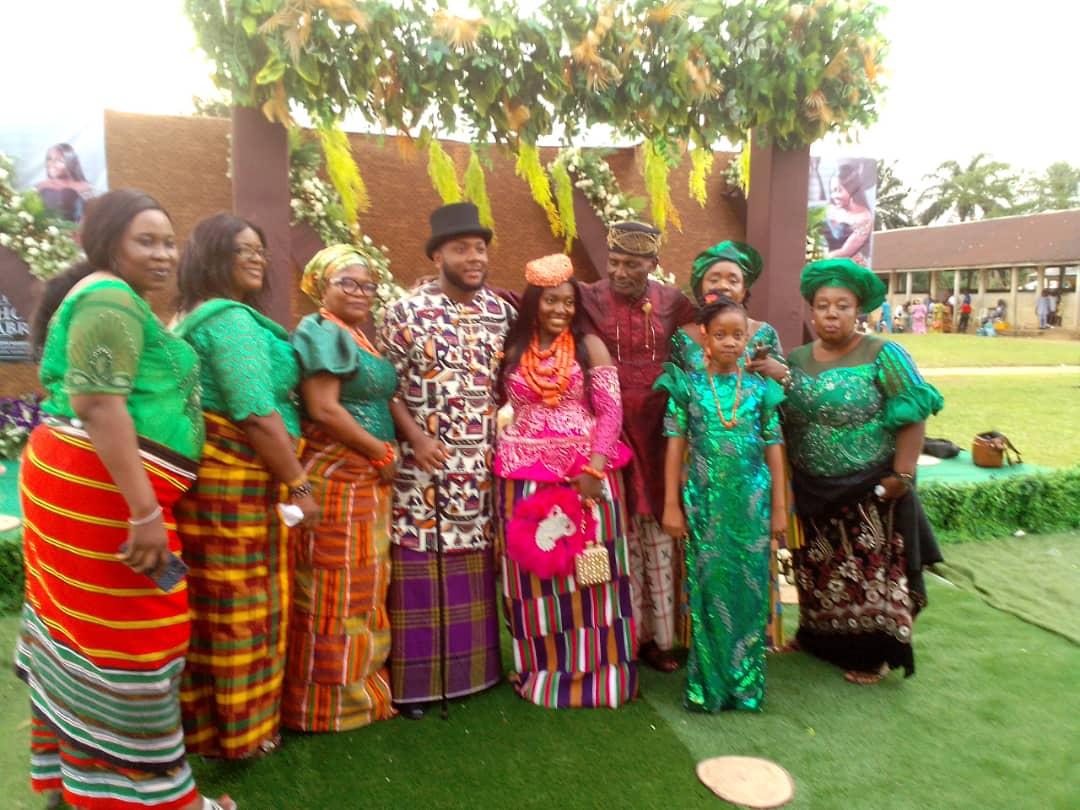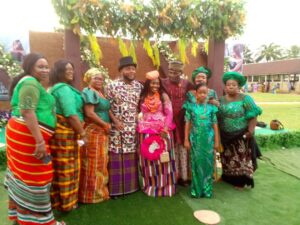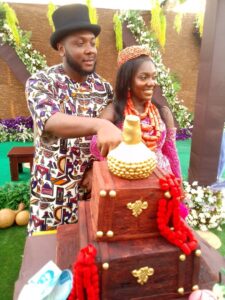Women
Gender Inequality: The Nigerian Situation
Each time I see my father, I feel a dangerous wave of anger. So much that I have to struggle with myself not to insult him or even do worse things to him. The situation becomes even worse when I see what my siblings have become. I just pray to God to continue to give me the strength to be able to totally forgive him, but I don’t think I can forget it. The injury is just too deep and present everywhere”.
This is the level of bitterness Damiete feels for her father. According to her, if it were possible to reverse the hand of the clock, she would have preferred to be fathered by another man. Her case is only one of numerous cases of gender inequality meted out to girls in the Nigerian society.
Damiete, now 35, is the second child of a family of four. She has an elder sister, who is 38 and is infected by HIV, a 33-year old younger sister, who still believes that her life depends on what she can get from men, and a younger brother (30), who feels that it is her primary responsibility to cater for all his needs at all times, and makes sure that she, her husband, and children have no rest until his usually bloated demands are met.
“I don’t blame him”, she said, “He grew up being indoctrinated by our father that while there is no need to train girls because they belong to their husbands’ families, it is the responsibility of women to cater for their siblings and parents”.
She recalled that as a girl, it was easy for her and her two sisters to understand that the only plan their father had for them was for them to get married and leave his house. At what age they did this did not matter to him.
Meanwhile, he focused on the only son of the family, assuring him that he is the man of the family. The situation became unbearable after the death of their mother, with their younger brother barely three years.
Out of frustration, her elder sister had a bastard son at the age of 16. Her second pregnancy was with a fisherman, who was cohabiting with two women but had children with a total of five women. Her sister, however, fell for him because he always gave her fish from his catches, which ensured food for them as a family, including their father.
She later had a miscarriage with a notorious boat driver whose prowess as a womanizer transcends the Kalabari Kingdom in the South-South of Nigeria. It was in trying to save her life from the effects of the miscarriage that she was diagnosed of HIV, which she is currently living with, “though she has realised herself”.
For her younger sister, Banimi, who is still carried away by her beauty, which is fast fading away, she believes that having been able to build a three-bedroom bungalow through resources garnered from her numerous sexual escapades, she can have ample investments through the same source that can take care of her at her old age.
On her own part, she reminisced, she got lucky to have met her husband as a friend when she was just 14 years old, two years after she forcefully lost her virginity to a friend of her father, who feigned to be a helper of the family.
Her husband, then a rig worker with an oil company, lived in her community. After they became friends, he found out she wasn’t schooling. She had dropped out of school in Primary 3 after her periwinkle business couldn’t provide the required fund for her school. She thus concentrated on how she and her siblings can feed daily.
Her husband ensured that she went back to primary school, then to secondary and subsequently university, where she bagged a B.Sc. in Banking and Finance. As a Bank Manager, she is now not only the breadwinner of her family, but also the only one with a stable and assured future.
Currently, Damiete has to contend with maintaining her job, taking care of her nuclear family, which comprises her husband and three children, her siblings, whose dependence on her increases by the day, and her father, who unrepentantly prides himself as the source of her success, simply because he is her father, and hence demands to be taken care of.
This may be only a minute case in gender inequality taken too far at the detriment of a family, community, State, and country.
Gender Inequality is simply the state of not treating the male and female genders equally, or the situation where the male and female are not given equal perspectives, as portrayed in the above case. It takes different forms in different places and countries.
This is against the United Nations Sustainable Development Goals (SDGs) 5, which seek to “Achieve gender equality and empower all women and girls”, in the next fifteen years, beginning from September 25, 2015.
The sole objective is to provide women and girls with equal access to education, health care, decent work, and representation in political and economic decision-making process, which will expectedly fuel sustainable economies and benefit societies and humanity at large.
It is noteworthy that all the 17 SDGs, with 169 targets between them, are intertwined: Goal 1, for instance, which seeks to “end poverty in all its forms everywhere”, also recognizes the fact that gender inequality plays a large role in the perpetuation of poverty and risks inherent thereto, as portrayed by the Damiete scenario.
As far as Damiete’s elder sister is concerned, she has been “exposed to potentially life-threatening risks from early pregnancy”, according to the third point under the SDGs’ Goal 1, while Banimi has to live with “often lost hopes for an education and a better income”.
Gender inequality which in this context implies unfair treatment given to female gender with respect to the male has many causes. The causes include culture and tradition, religion, lack of empowerment, mentality, and inadequate education, all of which are deducible from the Damiete scenario.
A critical analysis of the scenario reveals that Damiete’s father’s belief that girls belong to their husband’s family made him not to invest in the life of his three daughters by depriving them of the things they need to be self-sufficient and capable of contributing to the upkeep of the family.
In the process, his first and third daughters fell out along the way. The only son in whom he had all hopes also fell out. The only person that got empowered was Damiete, and it was because her husband, a man, came to her rescue.
The question is what would have happened to the entire family, if Damiete’s husband had not come into the life of the family?
Soibi Max-Alalibo
Women
The Desire Of Every Woman In Marriage

A woman needs a man that is honest, trustworthy, nice, loving and financially stable.
There are no two ways about finance in marriage. No matter the level of love, If there is no money, it is always difficult.

Referring to the Biblical belief in Genesis 3:Your desire shall be unto you……..
That is one aspect the woman expects her husband to take care of.
A woman wants a husband that is not lazy, at least helping to do one or two things. A man that is educated and intelligent.
She knows that there is a trait that her husband has. Traits of taking care of people, giving freely to people and caring for her family.
A woman wants to love a husband that has family interest at heart. A man that spends time with his family, remembering his family even as he is away from home.
A woman should not antagonise her husband because of one error or the other. No matter the level of offence he may have committed, you still show some love.

According to the Scripture, it is with wisdom that the women builds her home.
It is not as if the woman will not monitor her husband, but to certain limit. Don’t be a monitoring spirit. Don’t allow anything to take your joy.
Don’t loose trust in your husband.
The idea of checking your husband’s phone should be discouraged. The more you check your husband and his phone, the more you loose your joy.

The home should not be a battle ground for a woman and man. A woman should be able to ask herself if the check on her husband will pay her any good.
Draw a line to a point where you checkmate your husband’s activities.
A woman wants a man that will love her and telling her you love her will be all she desires.
Eunice Choko-Kayode
Women
What Women Want In Yet-To -Be Husbands
What women want in their yet-to- be husbands matters a lot as far as marriage is concerned.
A woman desires a good fnancial prospect. Interestingly, some modern women place a man’s financial potential as more desirable than they have in the past.
Many decades ago, women ranked it lower on the list. It still comes in after items like love and maturity, but perhaps today’s women realise that a good economic partner is good husband material.
Good health has been an important characteristic for women through the 20th century and remains so these days. One might argue that because we’re living even longer, health plays a huge role in the success of a marriage. Women are anxious to know that their partners are healthy to be able to run the family together.
You discover that in most faith based organisations, would- be couples are mandated to go for medical tests to ascertain their health status as it concerns HIV/AIDS, Genotype and other related ones. This according to stakeholders is to ensure that couples raise healthy families.
Ambition has become less important to women over time, though it still being considered even if women nowadays are thriving in the workforce competing with the male folk. It may be because more women are thriving in the workforce, they want a husband who has earning power but are not looking for him to be the sole provider.
More women want husbands with pleasing disposition. They may not want a man who is always moody. A man who is always cheerful is whom they desire.
Surprisingly, a man’s likes do not rank as high on women’s list of wants as it used to. Until recently, women are more willing to accept a man for who he his, despite the inevitable mood he may be.
Sociability from both men and women rank very high on their marriag material list. And for both sexes, it has been steadily moving up the list for many years. The rise of the “love marriage,” a partnership based on attraction rather than practicalities (like wealth or status) might mean that married couples are more likely to be friends and have mutual circles of friends.
A lot of couples want to associate with others and then socialise. Attending parties of other friends forms part of their marriage requirements.
Women have placed education and intelligence top making it one of their most desirable male traits for decades. This timeline coincides with more and more women receiving college education themselves. Once education becomes important in women’s lives, it is a more attractive trait in potential husbands.
Of course when a woman is educated, she is likely to go for an educated man. When they are gainfully employed, their income boost the family affairs faster.
Today, women are much more attracted to men who are interested in home and family than they ever have been. Men who have desire for their home and children is whom they desire.
After a days job, a man will come home to ensure that his children are comfortable. Because most women today are expecting to be in dual-earner relationships, they want husbands who will be happy and willing to contribute at home. More women today even report that they hope he will take the lead at home.
A woman wants a man who is emotionally stable and mature. Growing big physically is not the issue but maturity in the heart.
Men, too, place a heavy emphasis on a potential wife’s emotional maturity, signaling that it is a key quality for a stable partnership. Women seem to look past appearance to the heart of the matter.
A woman wants a man who is not easily provoked. Dependable character is what some women want in marriage.
Women want husbands that they can count on, and this has not changed in recent years. Yes, women look to their spouses to be lovers and friends, they also want them to be supportive and trustworthy. They want to know that their husbands will be there and remain loyal. Men, too, desire dependable character from their yet-to be wives.
Mutual attraction and love from the first appearance is what they want till they become old.
The highest-rated characteristic women seek from men is mutual attraction and love. Some no longer look for a man who will provide everything, afterall they are also educated and are gainfully employed, they want to be in love.
For some women, even when the man do not provide household needs, the love shown on her is enough. When women had no job prospects and needed to marry, they desired love . The women’s movement has not only helped women pursue careers, it has also given them more choice in love.
Women
Echoes Of IWD : Need To Invest In Women
As this year’s Internatinal Women’s Day (IWD) has come and gone, there are calls from different quarters on the need to invest in women so that we can achieve accelerated growth.
It was, indeed, a thing of joy when Rivers Women Unite For Sim, took delivery of large quantities of sanitary towels and some bags of rice provided them for this year’s celebration.
Many young women expressed joy that they got such gesture since some of them have financial problems getting sanitary towels whenever they are on.
Some secondary school students were also lucky to have a share of the benefits. They also got some sanitary towels.
The Rivers State Commissioner for Women Affairs organised a platform to celebrate and honour the women for the remarkable jobs they perform in their homes and society.
Addressing women on the occasion, the Hon. Commissioner for Women Affairs, Dr. Roseline Apawari Uranta, noted that women from time immemorial have been great pillars in achieving remarkable heights and stressed that IWD across the globe is pivotal all women for the roles they play in bringing, nurturing and sustaining life.
Dr. Uranta said that IWD, which started in 1911 and celebrated annually on March 8, is a global day that provides women a platform to address economic inclusion, participation in political and public life.
She said the day was set aside to look into lack of access to education for the girl-child, gender-based violence, child marriage, child trafficking, harmful cultural practices as well as other challenges facing women around the globe.
The Hon. Commissioner, who described March 8 as a day to celebrate the socio-economic, cultural and political achievements of women, emphasised that it is a day that offers women the opportunity to reflect on progressive achievements.
Noting that it is an opportunity to call for change, she stressed that it is also an opportunity to celebrate acts of courage and every achievement made by ordinary women who did extraordinary things and are remembered in history.
She noted that the IWD2024 theme:”Invest In Women, Accelerate Progress”, is timely and apt because according to her, to achieve gender equality, we must ensure that the rights, responsibilities and opportunities of women do not elude them.
Her words: ” We must see investing in women as a human right issue and consider investing in women as a social tool to eradicate poverty since women are helpmeet in the homes while a handful are breadwinners in their respective families”.
The commissioner urged women to uphold the deliberate act of investing in themselves, be it furthering formal education, developing a new skill as well as learning a trade.
“Shun idleness, always find something positive and productive to do, regardless of your age, social status and financial capabilities”, she said.
In a paper presentation, Dr. Dabota God’swill Jumbo, reiterated that investing in women would attract good and positive dividends to herself and the society at large and noted that it is essential in addressing poverty, hunger and climate change.
The guest speaker said women need more opportunities in elective and appointive positions, hence the need to encourage and support them in politics.
According to her, when you invest in women, they will be able to create safer environment devoid of gender-based violence.
In a goodwill message, the spokesperson, Rivers Women Unite For Sim, Mrs Charity Deemua appreciated the organisers for making it possible for women to gather and celebrate themselves.
She commended those who created a day like March 8 of every year to celebrate women and regretted that the girl-child was seen as a second-class person decades ago.
The former commissioner, Rivers State House of Assembly Commission, described those who taught it wise for women to celebrate as conquerors, tough and strong.
International Association of World Peace Advocates, a world-class organisation with the United Nations, honoured different categories of women.
In Cross River State, 150 women were empowered with about N15m to boost their small and medium scale businesses.
According to stakeholders, the women empowerment is vital in addressing social, economic and political challenges and will make them self-reliant.
An NGO, Association of Professional Women Engineering Technologists (APWET), said it’s aim is to promote professional excellence among engineering personnel, advocating for women and girl-child education.
With what we saw in terms of response to women’s call on issues affecting them from relevant authorities, we are optimistic that the women will do better whenever they are empowered.
If we must kick out cervical, breast and other forms of cancer in women, underage marriage, prostitution, we must invest in women.
There were goodwill messages from National Council for Women Societies (NCWS), International Federation of Female Lawyers (FIDA), Medical Women Association of Nigeria (MWAN), Nigeria Copyright Commission (NCC, Nigeria Association of Female Journalists (NAWOJ), among others.
By: Eunice Choko-Kayode
-

 Business3 days ago
Business3 days agoPaper Industry’s Economic Contribution Hits N398bn
-

 News3 days ago
News3 days agoPolice Attribute Societal Decay To Parents’ Too Much Love For Children
-

 Sports3 days ago
Sports3 days agoTennis: Abuja Set To Host Davis Cup
-

 Niger Delta3 days ago
Niger Delta3 days agoHYPREP’s Livelihood Training: Dana Air Employs Three Ogoni Youths
-

 Maritime3 days ago
Maritime3 days agoNavy Nabs 75 Stowaway Suspects In Eight Months
-

 News3 days ago
News3 days agoNLC Demands Creation Of State, LG Police
-
Editorial3 days ago
For Peace In The M’East
-

 News3 days ago
News3 days agoWomen Play Important Roles In Development Of The Society -Odu

